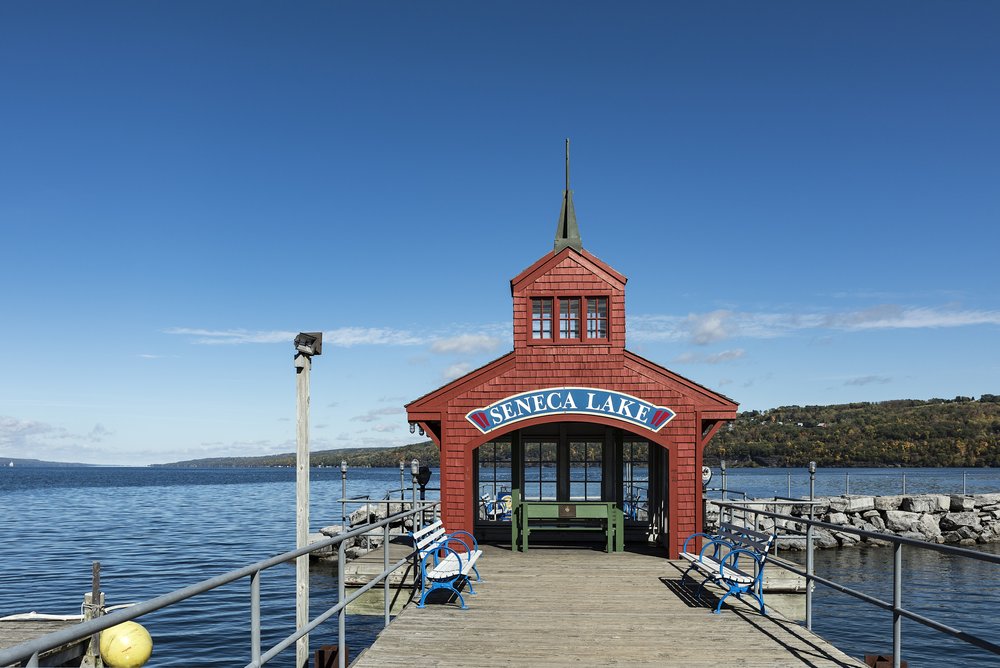Greenidge Generation continues to mine Bitcoin, profit while it violates NY climate law
Sept. 13, 2023, 2:16 p.m.
The cryptocurrency power plant is mining Bitcoin in record numbers, while an appeal process drags on over a denied environmental permit.

Greenidge Generation run a power plant on Seneca Lake that fuels a Bitcoin-mining operation by burning natural gas.
More than a year has passed since the New York State Department of Environmental Conservation rejected the air permit application of Greenidge Generation, a Finger Lakes power plant that fuels a Bitcoin-mining operation by burning natural gas.
According to publicly available documents, the cryptomining company is on pace for its most lucrative year to date as its appeal undergoes an administrative review with the state. The company is also operating with a water permit that expired last year.
Local community members and advocacy groups have pushed for Greenidge’s closure ever since 2018 when its air permit was up for a customary five-year renewal. In June 2022, the DEC rejected the renewal application on the grounds that the company had violated the Community Leadership and Climate Protection Act, or CLCPA — the state’s signature climate law that requires all industries and sectors to reduce their greenhouse gas emissions by 40% by the end of this decade. Cryptocurrency mining consumes large amounts of energy due to the large computer farms needed to solve the complex algorithms that release new coins.
The DEC’s assessment at the time was that Greenidge had no evidence of any plans to significantly reduce its actual emissions.
A month later, the company’s water permit came under jeopardy. The DEC cited the facility for operating without fish screens on its 7-foot-diameter intake pipes, which suck in nearly 140 million gallons of water from Seneca Lake each day at a maximum rate of 68,000 gallons per minute. Doing so can be deadly for fish and other aquatic life that gets sucked in, and fish screens are an inexpensive and standard practice at power plants, according to Edwin Cowen, a civil engineering professor at Cornell University. In January, the screens were installed after more than five years of operation without them.
Greenidge is appealing the air permit decision with an administrative law judge at the DEC’s Office of Hearings and Mediation Services, as part of the agency’s standard process for enforcement. This judge is an “an impartial person designated by the Commissioner of Environmental Conservation who independently evaluates the evidence,” according to the DEC.
In the meantime, the company has amassed a total of 1,368 Bitcoins for the first half of this year – a 16% increase over the same period last year. That amount of Bitcoin would be valued around $35 million as of Tuesday. Adding in its other Securities and Exchange Commission filings during its first three years of operation, the company has produced 7,111 Bitcoins currently valued at $186 million since the mining operation started in 2020.
Greenidge did not respond to a request for comment from Gothamist.
Without a strict timeline for proceedings, environmental groups fear that upstate cryptominers could continue to operate and pollute for years as a result of multiple appeals even if the administrative law judge upholds the DEC’s permit denial.
This loophole could be attractive for other cryptomining operations looking to acquire defunct fossil fuel plants upstate.

In September 2022, the New York State Public Service Commission approved the transfer of the Fortistar natural gas facility in North Tonawanda near Niagara Falls to Canadian cryptominer Digihost. Running at full capacity, the plant potentially could produce just over 600,000 metric tons of carbon dioxide per year, according to estimates provided by the environmental group Earthjustice. Digihost and Fortistar did not respond to a request for comment from Gothamist.
Greenidge’s site was formerly a coal plant that was shut down in 2011. Atlas Holdings LLC, a Connecticut-based investment company, bought the decommissioned facility and invested $100 million in converting it to natural gas. In the first year of mining in 2020, Greenidge emitted more than 400,000 metric tons of carbon dioxide, according to DEC documents.
In January, Earthjustice filed a lawsuit against the DEC for violating the CLCPA by allowing Digihost to take over the Fortistar plant.
“There's no mechanism under the law to stop the operations of the [Greenidge] plant while you're in litigation, while you're appealing the denial,” said Mandy DeRoche, deputy managing attorney in the Clean Energy Program at Earthjustice. “So they're allowed to continue operating even though their permit has been denied.”
DEC and Earthjustice said the administrative law judge has no deadline for delivering a decision, and the unit has no direct contact with the media or the public. The DEC’s administrative law judge heard oral arguments for the air permit case in December 2022, and by spring, both sides had submitted all necessary court documents and briefs.
“I was hoping for a decision by now; it's been several months,” said Mandy DeRoche, who is also the lead counsel on the litigation against Greenidge and represents a coalition of environmental groups, including Seneca Lake Guardian. “It's been a year; this plant can't keep operating.”
In its filed briefs, Greenidge states there is no legal precedent for rejecting an air permit on the basis of CLCPA compliance. The company insists that it has cut its emissions by more than 70% of its 1990s levels back when it was a coal plant under a different owner. Note that generating energy from coal produces 70% more carbon emissions than natural gas in general, according to the U.S. Environmental Protection Agency. Converting to natural gas also produces methane, a more potent greenhouse gas than carbon dioxide.
At the facility’s current maximum capacity, Anthony Ingraffea, a Cornell University civil engineering professor, estimated Greenidge pumps 1 million metric tons of carbon and methane into the air every year. That’s equivalent to two-thirds of the total emissions of neighboring Tompkins County or 0.37% of the state’s total greenhouse gas emission target for 2030.
If the administrative law judge rules against Greenidge, the company could appeal directly to the DEC commissioner. If that doesn’t work out in its favor, Greenidge can continue appealing through the appellate division courts and then all the way to the state’s highest judicial authority on the matter: the Court of Appeals.
“To say that the plant continues to operate as it crawls through opaque bureaucracy is accurate,” said Raya Salter, an environmental and climate justice lawyer who is a member of the state’s advisory Climate Action Council. “It's a slow and unsatisfying process.”
The Greenidge facility currently runs on an air permit that, given the denial of renewal, expired in November 2021.
“We have screamed at the top of our lungs loudly and clearly that we do not want this facility here in the region, and we are pretty much at our wits end,” said Yvonne Taylor, co-founder of the local environmental group Seneca Lake Guardian. “We don't really know where to go from here, but we're cautiously optimistic.”
Permit denied: New York says Bitcoin mining operation in Finger Lakes violates climate law Facing closure, Finger Lakes bitcoin miners boost revenue as they confront second environmental violation A campaign in NJ to unwind support for offshore wind energy is having an effect